Patanjali Sabudana: 5 recipes to delight your taste buds
Discover creative and delicious ways to use Patanjali Sabudana in your meals, from classic khichdi and crispy vadas to refreshing salads and sweet kheer.
Lord Krishna as a child was known for his love for cow milk and its by-products, so nothing matches the milk preparations to offer to the divine on his birthday
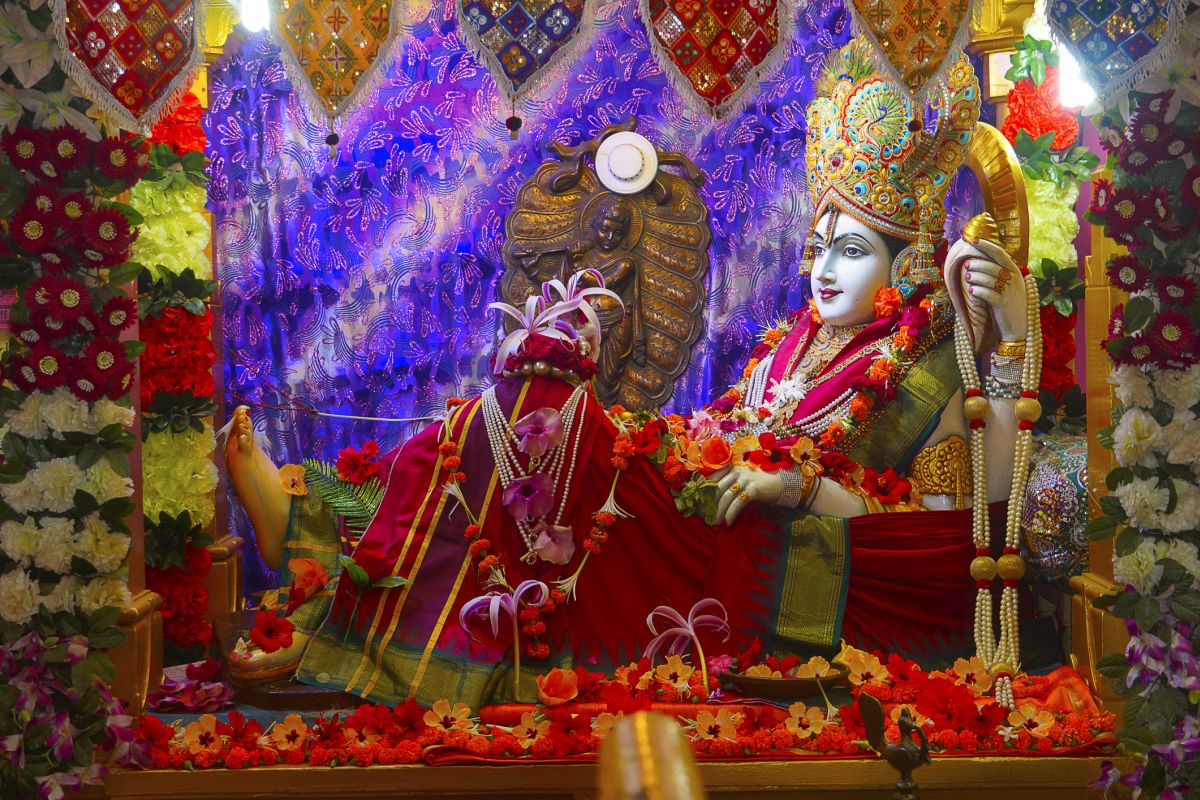
( Representational Photo: Getty Images)
Shri Krishna has a special connection with the divine bovine – cow. Growing up in Vrindavan, he was known as Gopala, which means one who looks after the cow. Lord Krishna as a child was famous for his immense love for cow’s milk and its by-products especially white butter. He was famous for being the incorrigible butter thief. He used to steal butter not out of any uncontrollable craving or criminal leanings, the lord was beyond the desires and negative tendencies. This act had a deep spiritual meaning. He only wanted to divert the attention of his most dedicated devotees, the gopis by stealing butter. This way he used to steal their hearts as well.
On Krishna’s birthday, Janmashtami, mouth-watering milk delicacies are prepared to please the Lord.
This Janmashtami prepare some sweet at home using pure cow milk and offer to almighty as bhog to seek his blessings. Although every food which is offered to Krishna with love and affection becomes his favourite food. He always sees the mood in which the food item is prepared and offered to him, he does not see what item you offer. So Krishna’s liking for food is directly proportional to the quality of love the devotee pours in while making the dish and he has during the offering. However, devotees can always think of serving him with cow milk food preparations knowing that he is fond of cow milk.
Advertisement
Food is the way to heart and that seems to apply for Lord Krishna as well. Here are a few of the preferred foods of the deity that you can make in your kitchen on Janmashtami and offer the lord as bhog:
Makhan Mishri

Boil five litres of cow milk and let it cool at room temperature. Then refrigerate it for 12 hours. You will see a thick cream layer formed on the top surface of the chilled milk. Remove it and collect it in a bog bowl. Beat it with an electric beater or a spatula for 10 to 15 minutes or until a thick layer of butter and milky water get separated. Squeeze out the milky water by slightly pressing the butter between your palms. Collect it in a clean container. Mix it with a spoon and refrigerate for three hours. It is the most favourite food of Krishna. Offer it fresh with mishri to the Lord.
Kesar Shrikhand
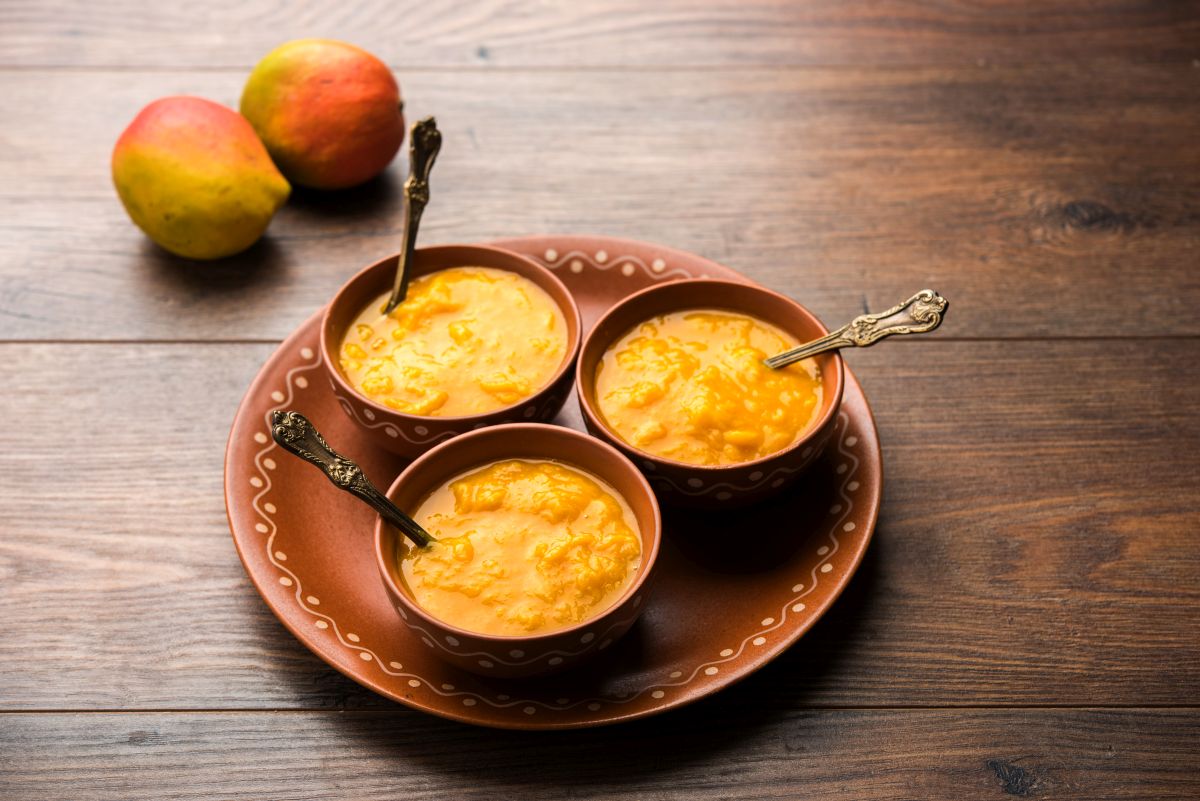
Take one litre of yogurt made of cow milk. Place a strainer on a deep bowl. Line it with a muslin cloth. Pour fresh yogurt into it and bring four edges of the muslin cloth together and tie a knot on the top tightly. Gently press it to allow the whey to drop out. Now place the tied yogurt with the strainer in a deep bowl so that there should be a distance between the strainer and the dripping whey. Put some weight on the tied yogurt and keep the whole thing as it is in the fridge for six to seven hours. After that transfer the hung curd in another glass bowl. Discard the whey or use it to knead dough for chapatis. Dissolve 15 to 20 saffron strands in two tablespoons of milk. Stir well and keep aside. Finely powder two to three green cardamoms. Add one cup powdered sugar, dissolved saffron strands and cardamom powder in the yogurt and mix gently. Whip with an electric beater to make it smooth and even. Chill it in fridge. Shrikhand is ready to be offered to Lord Krishna. Garnish it with few sliced pistachios.
Kesar-pista-badam milk
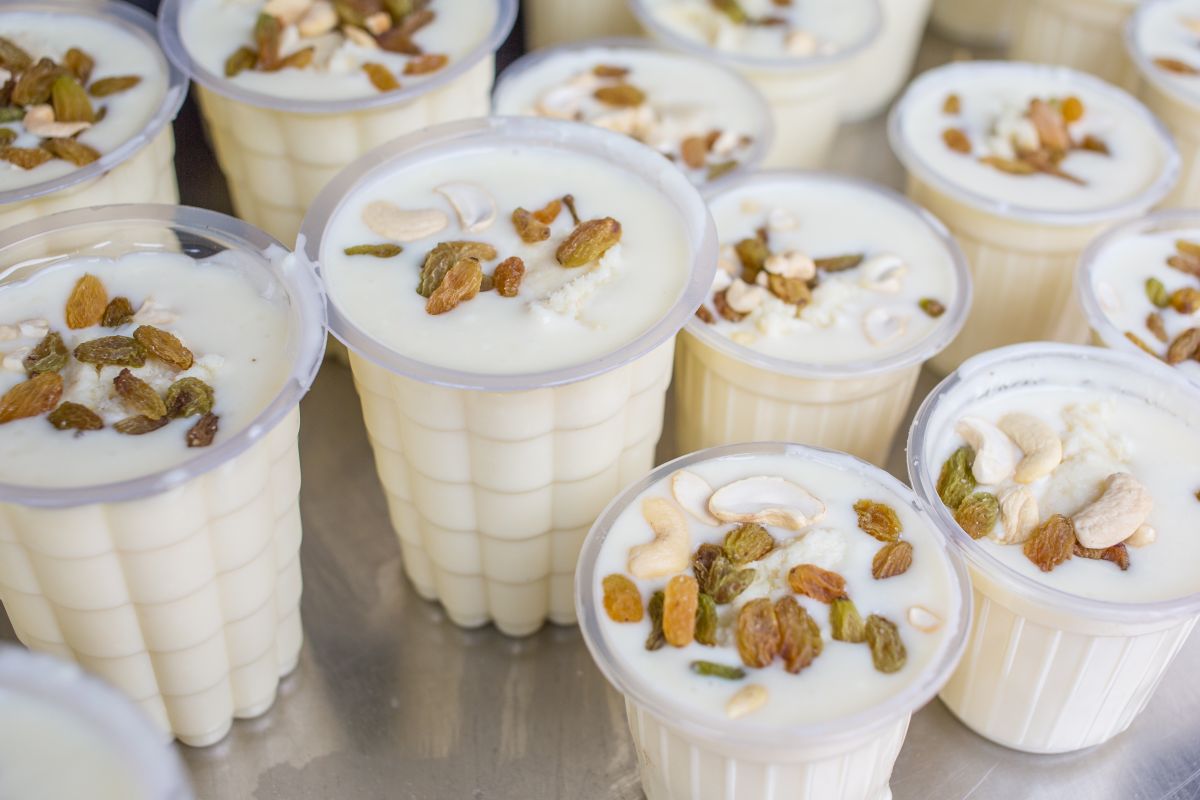
Soak 15 almonds in water for four to five hours. Discard the brown skin. Take half a cup of cow milk and add soaked almonds, two green cardamoms, two pinches of saffron strands and three teaspoons of sugar into it. Blend all these ingredients in a high-speed mixer grinder to make a fine paste. Keep aside in fridge. In a thick bottomed pan, boil 500 ml of cow milk. Bring to a boil on high flame and then simmer on low flame for 10 minutes. Add badam, saffron, cardamom and sugar paste. Stir well. Let it simmer for 10 more minutes on low flame. Turn off the flame. Add eight to 10 sliced pistachios. Let it cool. Refrigerate it for three to four hours. Offer to Krishna.
Rabri
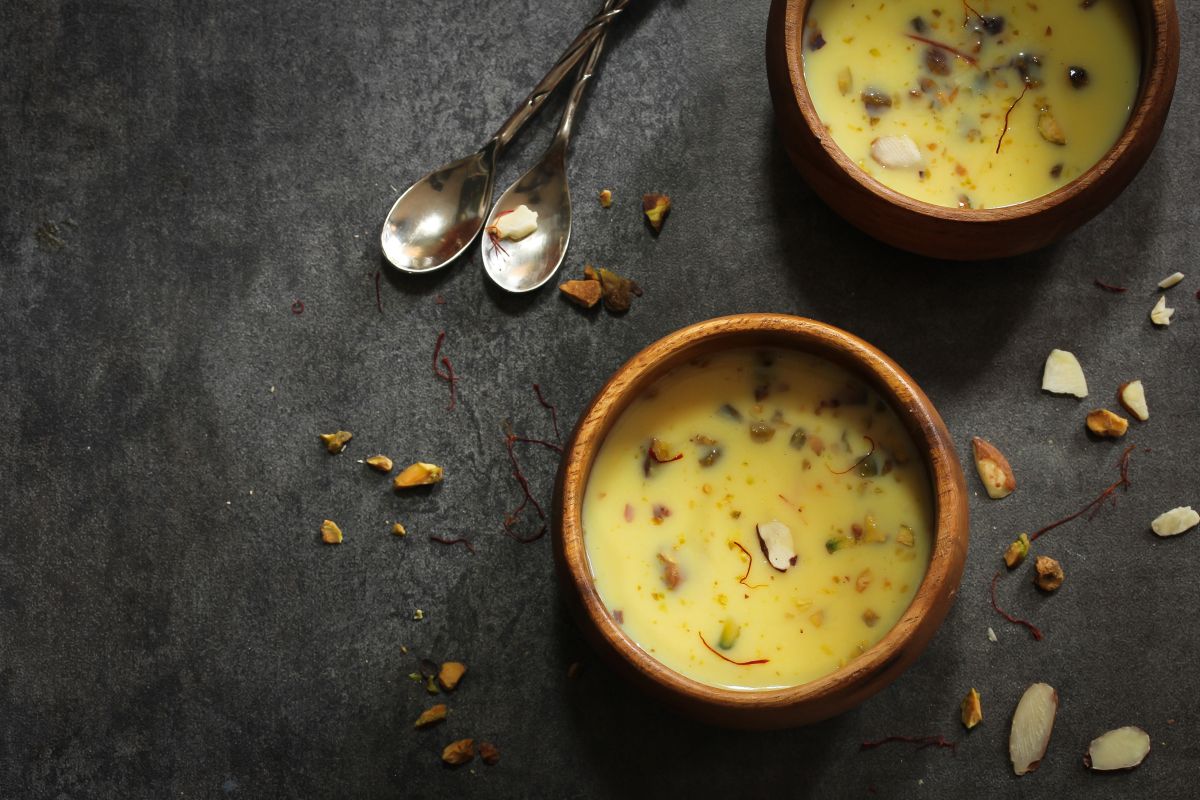
Take two litres of cow milk. Boil it in a thick bottomed big pan. Give a boil on high flame and then simmer on medium low flame stirring occasionally until the milk starts forming a layer of cream on the top. Gently move the cream with a spatula to the side of the pan and stick it there. Keep on doing this and collecting the cream on the sides. The process has to be continued till the milk reduces to half. You have to stir the milk gently on occasions to avoid it getting burnt and at the same time to allow the cream layer to form at the top. If you will continuously keep stirring the milk, the cream layer will not form. After the milk reduces to half, add seven tablespoons of sugar, one teaspoon of freshly crushed cardamom powder and two pinches of saffron strands. Stir gently. After adding saffron, the colour will change to yellow. When the milk gets reduced to one-fourth of the original quantity, turn off the heat. Scrape off the entire cream from the sides and add it to the thickened milk. Stir gently. Add two teaspoon of kewra water or rose water and stir gently. Let it cool. Refrigerate for five hours. Offer to the lord with all love and devotion.
Coconut laddu
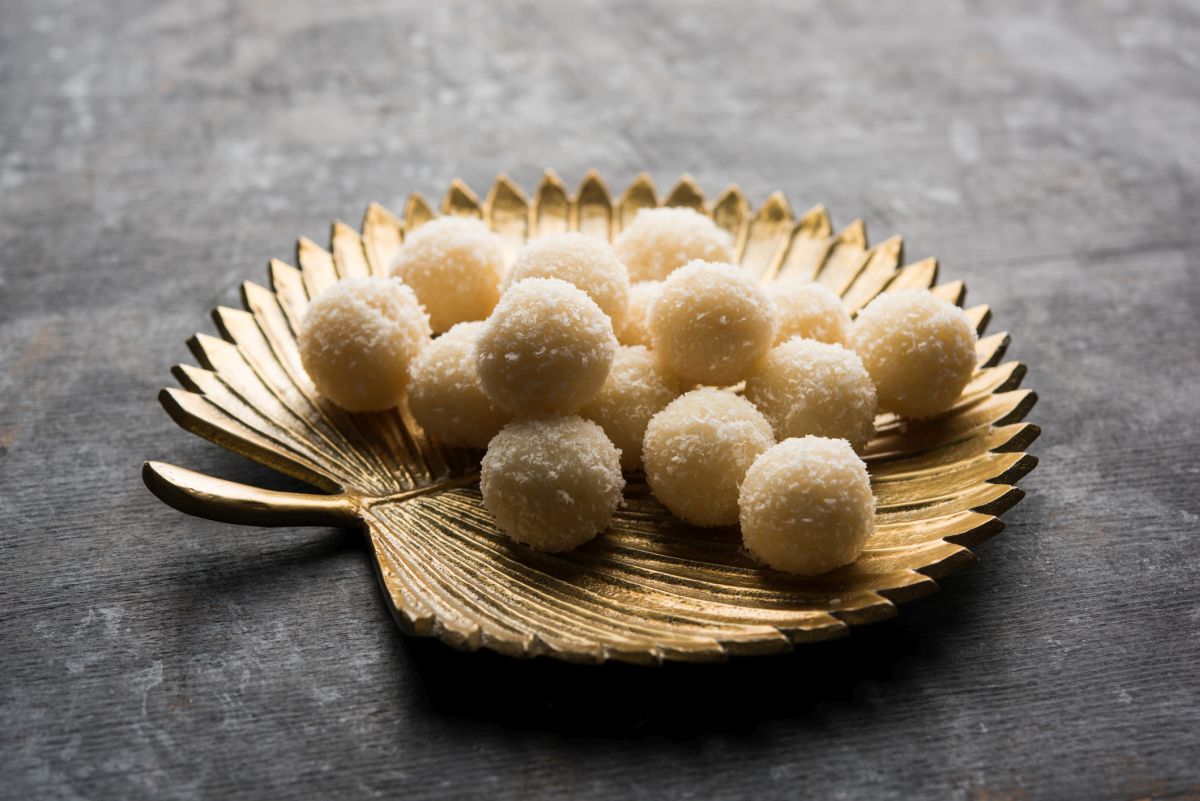
Prepare mawa with cow milk. To prepare mawa, boil two litres of cow milk in a thick bottomed pan and simmer it on medium low flame after a boil comes on high flame. Stir occasionally. When the quantity of milk gets reduced to one-fourth, keep stirring continuously on low flame until it gets thickened more and achieves the consistency of mawa. Transfer mawa in a clean container to stop further cooking. Let it cool. You will get around 200 grams of mawa with this quantity of milk. When mawa is slightly warm and can be handled easily with your hands, add 200 grams of grated coconut, one tablespoon of chopped cashews, one tablespoon of chopped almonds, two teaspoons of chirongi, one teaspoon of cardamom powder and 250 grams of powdered sugar. Mix well with your hands. Take small portions of lemon size in hands and roll them in laddu shape. Roll each laddu in coconut powder and serve to Krishna as bhog.
Krishna is part of Yadhavas who are the people who herd cows. This is the reason behind his love for cow milk. Prepare these sweet dishes on the lord’s birthday and offer them with love and truthful devotion. It is also important to maintain a meditative consciousness of love and devotion towards the god while preparing bhog. The god will gladly accept your offering. Having thanked him for accepting your offering, the prasad can be eaten by the devotees.
Happy Janmashtami!
Advertisement